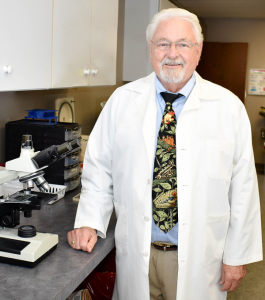
The best thing about Coenzyme Q10 adjuvant treatment of heart disease is that the CoQ10 treatment is a positive treatment. It does not block or reduce any neurohormonal activities in the body; instead, it enhances mitochondrial function in the process of cellular ATP energy production. And it provided antioxidant defense of the heart muscle cells. Pictured here: Dr. Svend Aage Mortensen, lead researcher on the Q-Symbio Study.
We have over 30 years of evidence from published clinical trials showing that the ubiquinone form of Coenzyme Q10 supplementation is safe, well-tolerated, and effective as an adjuvant treatment for heart disease patients. The ubiquinone form of Coenzyme Q10 is also stable and affordable.
It is important to remember that Coenzyme Q10 supplements vary considerably in their absorption and bio-availability. A recent comparison study has shown that the formulation of the supplement – the composition of the carrier oils and the heating/cooling process – is more important for absorption and bio-availability than the form of the supplement (ubiquinone or ubiquinol) is [Lopez-Lluch 2019].
In this review article, we summarize the best of the clinical trials of ubiquinone Coenzyme Q10 supplementation for the prevention and treatment of heart disease.
1. Q-Symbio Study of Chronic Heart Failure Patients
Daily supplementation of chronic heart failure patients with 3 x 100 milligrams of Coenzyme Q10 for two years significantly improved the patients’ symptoms and survival [Mortensen 2014]. A sub-analysis of the European portion of the Q-Symbio Study showed that the CoQ10 supplementation significantly improved the patients’ ejection fraction [Mortensen 2019].

Professor Urban Alehagen, Linköping University, is the lead researcher on the KiSel-10 study and was one of the chief researchers on the Q-Symbio Study. As such, his research has encompassed both the preventive and the therapeutic effects of CoQ10 supplementation on heart disease.
2. KiSel-10 Study of Senior Citizens and Heart Function
Daily supplementation of senior citizens with 2 x 100 milligrams of Coenzyme Q10 in combination with 200 micrograms of an organic high-selenium yeast preparation significantly reduced cardiovascular mortality, improved heart function, reduced the levels of bio-markers for inflammation and oxidative stress, and improved health-related quality of life [Alehagen 2013]. Follow-up analysis has shown that the significantly reduced cardiovascular mortality effect has persisted through year 12 [Alehagen 2018].
3. Italian Multi-Center Heart Failure Study
Daily supplementation of heart failure patients with two milligrams of Coenzyme Q10 per kilogram of body weight for a year – corresponding to 150-200 milligrams of Coenzyme Q10 per day for most adults – in addition to conventional heart failure medication resulted in significantly less congestion and edema of the lungs as well as significantly fewer complications and hospitalizations [Morisco 1993].
In a second Italian multi-center heart failure study from the same period – a study enrolling 2664 heart failure patients – a daily dose of 50 to 150 milligrams of Coenzyme Q10 given in addition to the conventional heart failure medicine for three months was associated with significant improvement in the following symptoms:
- Low levels of oxygen in the blood
- Excessive levels of fluid in body cavities
- Rattling sounds caused by lung congestion
- Distension of the jugular vein
- Irregular heart beat
- Loss of balance
4. Coenzyme Q10 Treatment in Serious Heart Failure Study
Daily supplementation with 2 times 100 milligrams of Coenzyme Q10 for 12 weeks significantly improved the patients’ stroke index at rest and at work and significantly decreased pulmonary artery pressure at rest and at work. The measurements were taken before and after treatment using right heart catherization. The results suggested that Coenzyme Q10 supplementation is strongly associated with improvement in left ventricular performance [Munkholm 1999].

Dr. William V. Judy, SIBR Research Institute, has summarized the important clinical studies using Coenzyme Q10 in his 2018 Insider’s Guide to Coenzyme Q10, available on amazon.com.
In a similar study, researchers found that the improvements in symptoms and survival that heart failure patients made while on adjuvant Coenzyme Q10 therapy disappeared if the Coenzyme Q10 supplementation was withdrawn. The patients invariably suffered a clinical relapse if the Coenzyme Q10 supplementation was stopped when symptoms had improved [Judy 1991].
5. Combined Atorvastatin and Coenzyme Q10 Study
One of the unintended adverse effects of statin medications is that they inhibit the body’s bio-synthesis of Coenzyme Q10 [Okuyama 2015].
In a four-month study, patients were randomly assigned to receive 10 milligrams atorvastatin daily plus 100 milligrams of a Coenzyme Q10 supplement twice daily or 10 milligrams atorvastatin daily and a placebo twice daily. The patients in the intervention group had significantly better ejection fraction and improved NYHA functional class compared with the atorvastatin only group [Pourmoghaddas 2014].
6. Coenzyme Q10 and Selenium and Statin-Related Muscle Pain Study
In a study of heart patients diagnosed with statin-related muscle pain, muscle weakness, and muscle cramps, researchers found that daily supplementation with 2 x 100 milligrams of Coenzyme Q10 and 200 micrograms of organic high-selenium yeast tablets for three months significantly lessened the statin-associated symptoms of muscle pain and weakness [Fedacko 2013].
7. Coenzyme Q10 Before and After Heart Surgery Study
Heart surgery patients scheduled for heart valve surgery or coronary artery bypass surgery were randomly assigned to take Coenzyme Q10 supplements together with fatty acids, magnesium, lipoic acid, and selenium or to take matching placebos for two months prior to the surgery and for one month after the surgery [Leong 2010].
The active treatment significantly reduced the plasma levels of a known bio-marker for heart muscle damage and shortened the post-operation hospital stay by 1.2 days, thus reducing the hospital costs. There were no clinically significantly adverse effects of the supplementation before and after the heart surgery [Leong].
In an earlier similar study, heart surgery patients were given 100 milligrams of Coenzyme Q10 daily for 14 days before surgery and for 30 days after surgery. Compared to the control group, the CoQ10-treated patients’ cardiac index and ejection fraction were significantly improved. The CoQ10-treated patients’ recovery from heart surgery was shorter and much less complicated than the recovery time for the control patients [Judy 1993].
8. Coenzyme Q10 Treatment and Discontinuation of Statin Medication Study
Cardiology clinic patients who had been on statin medications for an average of 28 months and who showed statin-associated symptoms such as muscle pain and weakness, fatigue, breathing difficulty, loss of memory, and peripheral neuropathy were taken off the statin medications and were prescribed an average of 240 milligrams of Coenzyme Q10 daily [Langsjoen 2005].
Follow-up for an average period of 22 months revealed significant reductions in the prevalence of the statin-associated symptoms. The patients’ heart function remained stable or improved in most cases.
Discontinuation of the statin drug therapy and commencement of the Coenzyme Q10 treatment were not associated with any clinically significant adverse effects [Langsjoen 2005].
An earlier study by the same researcher, a six-year clinical study of therapy of cardiomyopathy with Coenzyme Q10, showed that Coenzyme Q10 supplementation is a safe and effective long-term therapy for chronic cardiomyopathy [Langsjoen 1990].
9. Coenzyme Q10 for Heart Transplant Patients Study
End-stage heart failure patients waiting for heart transplants received 60 milligrams of Coenzyme Q10 or matching placebo daily as an adjunct to their regularly prescribed heart medications. The Coenzyme Q10-treated patients showed significant improvement in NYHA class, in six-minute walk times, in fatigue levels, in reduced need to urinate at night, and in breathing. The CoQ10 treatment improved the patients’ symptoms, functional capacity, and quality of life [Berman 2004].
10. Coenzyme Q10 and Acute Myocardial Infarction
Daily supplementation of recent heart attack patients with 120 milligrams of Coenzyme Q10 for one month resulted in significant reductions in the incidence of angina pectoris, total arrhythmias, and left ventricular dysfunction. In addition, Coenzyme Q10 supplementation was associated with significantly fewer cardiac deaths and nonfatal second heart attacks. The heart attack patients on the Coenzyme Q10 treatment also had a greater reduction in lipid peroxides, indicators of oxidative stress. The researchers concluded that Coenzyme Q10 supplementation gives protective benefits to heart attack patients if the Coenzyme Q10 supplementation is started administered within 3 days of the onset of the heart attack [Singh 1998].
In a similar study, 32 heart attack patients started on daily supplementation with 100 milligrams of Coenzyme Q10 and 100 micrograms of selenium within six hours of admission to hospital and continuing for one year had only one death during the year, a non-cardiac death, whereas 29 similar heart attack patients taking placebos had six cardiac deaths during the year [Kuklinski 1994].
Conclusion: Coenzyme Q10 and Heart Disease
The outcomes from well-designed randomized controlled trials show that Coenzyme Q10 in daily dosages from 100 to 300 milligrams is a safe and effective adjuvant therapy for patients with cardiovascular diseases.
Coenzyme Q10 adjuvant therapy for heart failure patients is important. It is important to remember that not all supplement formulations are equally good and that the better absorption and bio-availability may cost a bit more per day.
Read our key article about CoQ10 and cardiovascular health in elderly people
Read our key article on CoQ10 as adjuvant therapy for heart failure
Sources
Alehagen, U., Johansson, P., Björnstedt, M., Rosén, A., & Dahlström, U. (2013). Cardiovascular mortality and N-terminal-proBNP reduced after combined selenium and coenzyme Q10 supplementation: a 5-year prospective randomized double-blind placebo-controlled trial among elderly Swedish citizens. International Journal of Cardiology, 167(5), 1860-1866.
Alehagen, U., Aaseth, J., Alexander, J., & Johansson, P. (2018). Still reduced cardiovascular mortality 12 years after supplementation with selenium and coenzyme Q10 for four years: A validation of previous 10-year follow-up results of a prospective randomized double-blind placebo-controlled trial in elderly. Plos One, 13(4), e0193120.
Baggio, E., Gandini, R., Plancher, A. C., Passeri, M., & Carmosino, G. (1993). Italian multicenter study on the safety and efficacy of coenzyme Q10 as adjunctive therapy in heart failure (interim analysis). The CoQ10 Drug Surveillance Investigators. The Clinical Investigator, 71(8 Suppl), S145-S149.
Berman, M., Erman, A., Ben-Gal, T., Dvir, D., Georghiou, G. P., Stamler, A., & … Aravot, D. (2004). Coenzyme Q10 in patients with end-stage heart failure awaiting cardiac transplantation: a randomized, placebo-controlled study. Clinical Cardiology, 27(5), 295-299.
Fedacko, J., Pella, D., Fedackova, P., Hänninen, O., Tuomainen, P., Jarcuska, P., & Littarru, G. P. (2013). Coenzyme Q10 and selenium in statin-associated myopathy treatment. Canadian Journal of Physiology and Pharmacology, 91(2), 165-170.
Judy, WV, Hall, JH, and & Folkers, K. (1991). Coenzyme Q10 withdrawal – clinical relapse in congestive heart failure, in: Biomedical and Clinical Aspects of Coenzyme Q, (Vol. 6), K. Folkers, G.P. Littarru and T. Yamagami, eds. Amsterdam: Elsevier. 283–290.
Judy, W.V., Stogsdill, W.W. & Folkers, K. (1993). Myocardial preservation by therapy with Coenzyme Q10 during heart surgery. Clinical Investigator, 71(8 Suppl): S155-61.
Kuklinski, B., Weissenbacher, E., & Fähnrich, A. (1994). Coenzyme Q10 and antioxidants in acute myocardial infarction. Molecular Aspects of Medicine, 15 Suppls143-s147.
Langsjoen, P., Langsjoen, P.H. & Folkers, K. (1990). A six-year clinical study of therapy of cardiomyopathy with coenzyme Q10, International Journal of Tissue Reactions 12, 169–171.
Langsjoen, P.H., Langsjoen, J.O., Langsjoen, A.M. & Lucas, L. A. (2005). Treatment of statin adverse effects with supplemental Coenzyme Q10 and statin drug discontinuation. Biofactors, 25(1-4): 147-52.
Leong, J., van der Merwe, J., Pepe, S., Bailey, M., Perkins, A., Lymbury, R., & Rosenfeldt, F. (2010). Perioperative metabolic therapy improves redox status and outcomes in cardiac surgery patients: a randomised trial. Heart, Lung & Circulation, 19(10), 584-591.
López-Lluch, G., Del Pozo-Cruz, J., Sánchez-Cuesta, A., Cortés-Rodríguez, A. B., & Navas, P. (2019). Bioavailability of coenzyme Q10 supplements depends on carrier lipids and solubilization. Nutrition, 57, 133–140.
Morisco, C., Trimarco, B., & Condorelli, M. (1993). Effect of coenzyme Q10 therapy in patients with congestive heart failure: a long-term multicenter randomized study. The Clinical Investigator, 71(8 Suppl), S134-S136.
Mortensen, S. A., Rosenfeldt, F., Kumar, A., Dolliner, P., Filipiak, K. J., Pella, D., & Littarru, G. P. (2014). The effect of coenzyme Q10 on morbidity and mortality in chronic heart failure: results from Q-SYMBIO: a randomized double-blind trial. JACC. Heart Failure, 2(6), 641-649.
Mortensen, A. L., Rosenfeldt, F. & Filipiak, K. J. (2019). Effect of Coenzyme Q10 in Europeans with chronic heart failure: A sub-group analysis of the Q-Symbio randomized double-blind study. Cardiology Journal, 26(2): 147-156.
Munkholm, H., Hansen, H. H., & Rasmussen, K. (1999). Coenzyme Q10 treatment in serious heart failure. Biofactors (Oxford, England), 9(2-4), 285-289.
Okuyama, H., Langsjoen, P. H., Hamazaki, T., Ogushi, Y., Hama, R., Kobayashi, T., & Uchino, H. (2015). Statins stimulate atherosclerosis and heart failure: pharmacological mechanisms. Expert Review of Clinical Pharmacology, 8(2), 189-199.
Pourmoghaddas, M., Rabbani, M., Shahabi, J., Garakyaraghi, M., Khanjani, R., & Hedayat, P. (2014). Combination of atorvastatin/coenzyme Q10 as adjunctive treatment in congestive heart failure: A double-blind randomized placebo-controlled clinical trial. ARYA Atherosclerosis, 10(1), 1-5.
Singh, R. B., Wander, G. S., Rastogi, A., Shukla, P. K., Mittal, A., Sharma, J. P., & Chopra, R. K. (1998). Randomized, double-blind placebo-controlled trial of coenzyme Q10 in patients with acute myocardial infarction. Cardiovascular Drugs and Therapy, 12(4), 347-353.
The information presented in this review article is not intended as medical advice and should not be construed as such.
1 November 2019









Leave A Comment